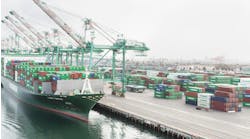Download this article in PDF format.
Supply chains made headlines in September thanks to a looming port strike, new strategic investments and advancements in technology. One of the big pieces of news was FedEx’s investment in artificial intelligence (AI) company Nimble—a move that was made to help the parcel carrier’s supply chain business.
According to Reuters, FedEx will leverage its new acquisition to “help scale up the delivery giant's fulfillment unit, which aids small and medium-sized businesses in fulfilling orders and managing inventory.”
The publication says parcel delivery companies are “ramping up investments in automation” in an effort to cut down on costs and boost efficiency at a time when freight demand remains subdued. FedEx said the investment would help streamline its supply chain capabilities across North America, through Nimble’s automated third-party logistics solutions.
“Our strategic alliance and financial investment with Nimble expand our footprint in the e-commerce space,” the company said, “helping to further scale our FedEx Fulfillment offering across North America.”
Port Strike Looms
All eyes are on U.S. ports right now as a coast-wide dockworker strike looms in the near future. CBS says thousands of dockworkers at every major East and Gulf coast port are girding to strike—a move that could close trade gateways that handle about half of all goods shipped in containers in and out of the U.S.
The International Longshoremen’s Association (ILA), which represents 45,000 dockworkers, is threatening to strike at 36 U.S. ports if a new labor deal with the USMX isn’t reached before the current contract expires at midnight on Sept. 30. A walkout would be the first East Coast dock strike since 1977. A potential walkout likely involves 25,000 workers, CBS reports.
“Negotiations between the union representing dockworkers and a shipping industry group representing terminal operators and ocean carriers have been stalled for months,” the news outlet says, “with both sides this week issuing conflicting statements about their willingness to bargain.”
Measuring the potential impacts of a strike on the nation’s supply chains, The New York Times says some importers started ordering Christmas goods four months earlier than usual to get them through the ports before the labor contract between the operators of port terminals and the International Longshoremen’s Association expired.
Many shipments have also been diverted to West Coast ports, NYT adds, where dockworkers belong to a different union that agreed to a new contract last year. Even with these proactive moves, it says a short strike could lead to significant disruptions.
“JPMorgan transportation analysts estimate that a strike could cost the economy $5 billion a day, or about 6 percent of gross domestic product, expressed daily,” the publication reports. “For each day the ports are shut down, the analysts said, it would take roughly six days to clear the backlog.”
Combatting Supply Chain Threats
Also in September, the U.S. Department of Homeland Security (DHS), United Kingdom (U.K.)’s Department for Business and Trade of the United Kingdom of Great Britain and Northern Ireland, and Australia’s Department of Industry, Science, and Resources established the United States-United Kingdom-Australia Supply Chain Resilience Cooperation Group to enhance efforts to combat threats to critical supply chains.
According to DHS, the new group will develop an early warning pilot focused on the telecommunications sector. This sector is critical to the shared economic security of the three participating nations, it says, and the pilot program will identify and monitor potential disruptions to supply chains in the telecommunications sector.
“The resilience of our critical supply chains is a homeland security and economic security imperative,” said Secretary of Homeland Security Alejandro N. Mayorkas in a press release. “Collaboration with international partners allows us to anticipate and mitigate disruptions before they occur.”








